A star is born
After his dramatic win in the 97th edition of Milano-Sanremo , 24 year old Filippo Pozzato is the...
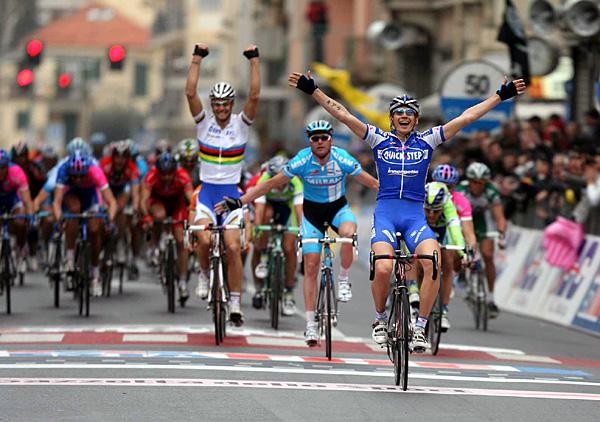
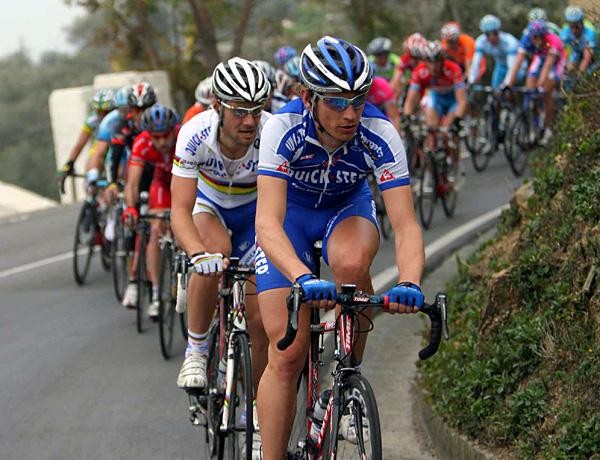
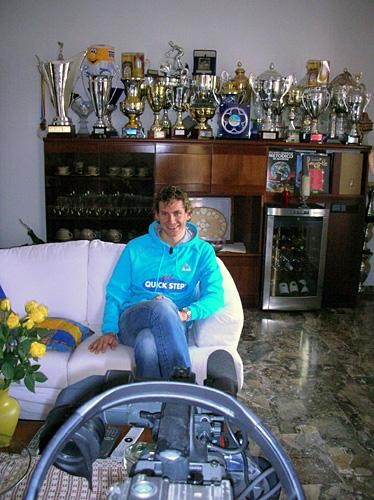
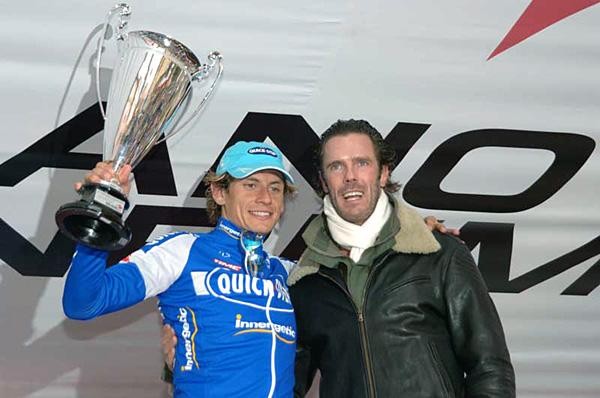
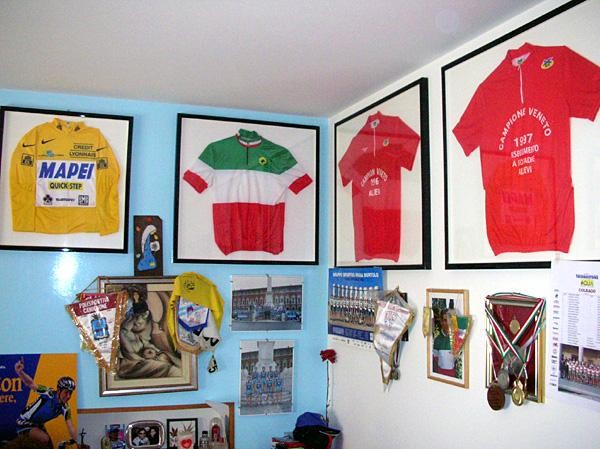
An interview with Filippo Pozzato, March 27, 2006
After his dramatic win in the 97th edition of Milano-Sanremo, 24 year old Filippo Pozzato is the new star of Italian cycling. Like his near neighbour in Verona, 2004 Giro d'Italia winner Damiano Cunego, Pozzato was born in 1981 and is seen by the tifosi and "i big" in Italian cycling as the next great Italian classics rider. Cyclingnews' Tim Maloney recently sat down with Pozzato at his home in Sandrigo, near Vicenza, Italy for an interview where the friendly, likeable Quick.Step rider told us about the big win on via Roma and his big plans for the rest of the 2006 season.
While Pippo finished an interview with SkyTV, we visited with his dad Carlo, mom Franca, who offered Cyclingnews warm Italian hospitality, as did friendly yellow lab Sandy who took advantage of the wait to have numerous pets and belly rubs.
Finally Pippo came into the cucina and we spoke to him before he sat down to a high protein lunch. We showed him a copy of photographer Roberto Bettini's win shot from Milan-Sanremo, with Pozzato's victory salute, runner-up Petacchi's clap of frustration just behind and teammate Tom Boonen's exultant salute of his own just behind in his distinctive World Champion's jersey.
Cyclingnews: Filippo, just what was going through your head at that moment?
Filippo Pozzato: Well I didn't realize that Tom had done that...Petacchi, I don't care, but I really liked Tom's gesture. Above all, as a sportsman, as a person, he showed he's a great guy.
It was something spontaneous, something from his heart. Tom gained a lot of points with me as far as I'm concerned with that gesture. In fact, at the Tour of Flanders, I'm more willing than ever to help him win. To be up front with him and help him win again would be beautiful.
The latest race content, interviews, features, reviews and expert buying guides, direct to your inbox!
CN: Twenty meters before the finish line in Sanremo, you looked back of your left shoulder. What was going on then?
FP: Before that, I was looking back between my legs to see if anyone was coming around me. So when I looked around then and saw I was going to win, it was just a feeling of liberation. It was such a beautiful moment when I realized I was going to win...to explain it to someone who isn't a racing cyclist, who hasn't felt those emotions is really difficult. I think that it's only the athletes who can understand this feeling.
CN: I know that winning Milano-Sanremo was a longtime dream for you.
FP: Yeah. When I won, a lot of things, a lot of people passed through my thoughts. Probably the best is that ten seconds of total joy when you realize you won, when you cross the finish line and so many things go through your mind...
CN: Now your name is written in the pantheon of cycling!
FP: Well, you have to win a lot before that happens. Milano-Sanremo is an important race, so it's something that will stay around for me.
CN: The morning of Milano-Sanremo, we spoke at the start and you told me that you hoped to be able to play your own card. What was the Quick.Step race plan that day? Obviously it worked well as Quick.Step dominated the race.
FP: Our plan that day was to cover early breaks and when the right break got away, we could sit back. Then we wanted to to keep everything together over the Cipressa for Boonen. Put all of out guys up there. And Bettini wanted the OK to attack on the Poggio. My job was to cover all the breaks. But in cycling, it's important to realize that you don't always have to listen to the orders from the team car. We have a lot of fantasia too, to be able to come up with some move, something in the moment. Our team was really great that day; we just didn't make any mistakes.
CN: What happened on the Cipressa climb?
FP: I was feeling really good and was on the front for the last half of the Cipressa. There were some attacks and first I went after Arvesen, then Mazzanti and I noticed that no one managed to get a gap because there was a headwind. So I realized that the race would probably end of the sprint and it was time to work for Boonen. I went on the front and started to ride hard tempo to keep it together. I asked Tom how he was doing and he said "OK". I was at the front until the summit. Then at the base of the descent, there was a really important moment because Guido Trenti went in the break. (Quick.Step) could sit back. Otherwise I would have gone to the front to chase down the break. So everything just went perfectly from the base of the Cipressa on.
CN: Why was Trenti in that break? Usually he's Boonen's leadout man.
FP: Because he was in the right place at the right time. He saw the attack go and went with it because he realized if he did, Tom and I could sit back and not have to worry. The other teams had to work and we didn't which was perfect, fantastic.
CN: OK, now we're at the base of the Poggio. What was going on with 9km to go in Milano-Sanremo?
FP: When we made the turn onto the Poggio, I was too far back, like in 40th position. We were all lined out and slowly I managed to move up. I was expecting two riders to attack: Bertagnolli and Ballan. When I looked at Bertagnolli's face, I could tell he was cooked. Then I tried to talk to Paolo (Bettini) but he didn't say anything. I had finally made it up to front after a few kilometres and as I was looking at the front, Ballan attacked hard. I didn't hesitate for a second and got on his wheel. I think that was the best thing to do at that moment. Ballan made a great move and someone had to cover it. I know Ballan well because we often train together, but when we're racing we are wearing different jerseys.
CN: So you and Ballan and a couple of other riders had gotten a gap by the top of the Poggio. Then you got a message in your earpiece from the team car.
FP: They told me to not pull even one meter...
CN: What did you think? Was that the right thing to do in that situation?
FP: I'm not sure I agree with those orders, because if I worked up front, the chase group wouldn't have come as close as they did in the last kilometre. I was the fastest sprinter in the break, but I wasn't working. I didn't like that; it's not my way to race. But in a big team, you have to follow orders. In the end, it all worked out, but if the group had caught us sooner and Boonen was second, then it would have been a mistake. I still think it was a mistake to not have me work when we got away.
CN: Now you have finished the descent of the Poggio and are on the via Aurelia with 2 km to go.
FP: I looked behind and saw we had a gap. I had told Ballan and Astarloa that I couldn't collaborate and they didn't say anything because they understood my situation. But I didn't like it and I said so even in the press conference. But I managed to take the maximum advantage of the situation in the last kilometres; Astarloa closed down the attack by Sanchez and I followed him. I didn't attack, but I just increased my pace gradually.
Maybe that's where I won Milano-Sanremo - in the S-bends before you enter into via Roma. Maybe if I had been able to work in the final, it would have come down to a smaller sprint, which was good for me since I was the fastest. But it went the way it went and I won. If not, all of our work on Quick.Step would have been for nothing.
CN: It was nerve-wracking to watch the images from the helicopter; the chasing peloton almost caught you just as you started your sprint.
FP: If you look at the sprint, when I went, I gapped Petacchi and the rest when I went. You know, I was going hard since the Cipressa, then the Poggio...I wasn't always sitting on the wheels like the sprinters, and I started my sprint with 350 meters to go. So it's normal that the sprinters would come back to me. In my opinion even if we had a sprint, I would have gotten a good place. After 300km, I think I'm very competitive in a sprint.
CN: Filippo, with the big win at Milano-Sanremo under your belt, now the Northern Classics are on your program. What's coming next?
FP: I'm riding the Three Days of De Panne, then Tour of Flanders, Gent-Wevelgem and Paris-Roubaix. I think I can do well at La Panne, to get a good result there to show that I can do more than just Sanremo. I'm racing through Paris-Roubaix, then if I need a rest I'll take some time off and if I feel good, I can do Amstel. I really want to help Boonen win at Flanders, too. Then there's Roubaix, where I went well last year. And Gent-Wevelgem...last year I crashed twice.
I would really like to win another classic this season. Once the first part of my season is over, I'll take some recovery time, then start again at Catalunya, Dauphiné and the Tour De France.
CN: What will be your role on Team Quick.Step at the Tour?
FP: Well I would like to try to win another stage, and for the sprint stages, to help Tom (Boonen). But on some stages, they are good for me and I think Tom will even help me out. We'll have an excellent team for the Tour and are really looking to ride well that first week.
CN: What out about the World Championships? Have you looked at the course yet?
FP: No, no! I have no idea about it and I think it's kind of crazy to even think about the World Championships at this time of the season. We'll see...if I'm in shape, I'm happy to be selected to the World's.
CN: Since your Sanremo win, have you had any peace?
FP: Not much! It's been kind of crazy, with a lot of attention but things are calming down. I'm glad to be able to be accessible, but not too much. I had to change my mobile telephone number because the old one was ringing all the time. Now only a few people have it.
After a check on the construction of his new house in Bassano del Grappa, a two hour ride, a long TV interview and a friendly half-hour chat with Cyclingnews, it was finally time for Filippo Pozzato to eat his lunch at 4pm, so we left him in peace with his mom, girlfriend Chiara and of course, Sandy the Lab who was ready to help Pippo with any lunch leftovers. Although his recent success has brought Pozzato a lot of attention, the handsome 24 year old has his two feet solidly on planet Earth. Close to his family and friends, Pozzato is a bravo ragazzo (good guy) who isn't likely to get a big head from his cycling success. And Pozzato's biggest success are yet to come, as his talent and class will only improve with age.
Also see: October, 2004 interview with Filippo Pozzato: The Natural
